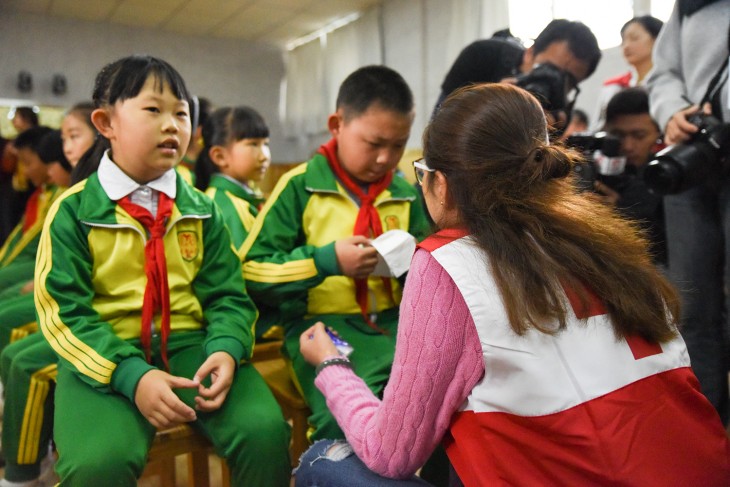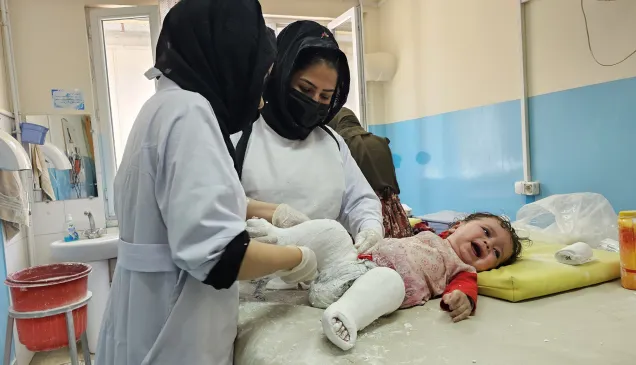China: How the internet and big data are changing humanitarian outreach

It was an ordinary morning in Kunming, Yunnan Province, when students at Longxiang Elementary school suddenly found themselves under attack from four "terrorists" armed with machetes. The school immediately launched emergency measures, with the police and medical staff promptly joining in. Shortly afterwards, psychologists from the Red Cross Society of Yunnan Province offered the students counselling and other support.
This wasn't a real situation, but an emergency response and psychological intervention exercise that was jointly organized by the Wuhua District Red Cross, the Red Cross Society of China (RCSC) and the International Committee of the Red Cross (ICRC) in October 2016.
This exercise was one of the first four initiatives to be funded by the Special Dissemination and Innovation Fund Programme launched by the RCSC and the ICRC in 2016.

Over two years later, the ICRC and RCSC continue to jointly select initiatives to support through the programme, providing 50,000 Chinese yuan each to the RCSC branches.
Since launching the Special Dissemination and Innovation Fund in 2016, the ICRC and the RCSC have added more initiatives to their list each year, going from funding five in 2017 to 15 in 2018.
"We hope innovative dissemination programmes will help us strengthen external ties, improve our ability to respond to violent situations and execute humanitarian operations, protect and promote the Red Cross emblem and guarantee the safety of staff and volunteers working in sensitive and dangerous contexts," explained Thomas Russell, who was with the ICRC's East Asia regional delegation at the time the programme was launched.
The programme has led to a number of digital initiatives across China, including 'Red Heart Hero' from Chongqing Red Cross, 'Fraternity Bedtime Reading' from Wuhan Red Cross, 'Humanitarian Border Tour' from Hekou Red Cross in Yunnan Province and 'One Button Rescue' from Nanjing Red Cross.
Reaping the benefits of big data
Incorporating big data into its humanitarian activities, the Wuhan Red Cross came up with the Fraternity Bedtime Reading programme – which promotes the spirit of humanity, fraternity and dedication through bedtime stories – after analysing data from Penguin Intelligence's 2017 China New Media Report.
According to the report, podcasts are rapidly replacing videos and books as the preferred form of entertainment since people can listen to them while driving or right before bedtime.

Big data analysis shows that 75.5% of 772 million netizens in China listened to podcasts on the internet at least once in 2017. Segments that appeal to people's emotions accounted for 32.5% of all podcasts, second only to news and entertainment presentations.
"Fraternity Bedtime Reading" is now simultaneously aired on four WeChat public accounts and seven online radio stations, including Himalaya and Lychee FM. By the end of October 2018, more than 120 audio stories had been produced and played over 250,000 times.
Digital innovations come knocking
The Jiangxi Red Cross recently launched the "Jiang Xiaohong" Humanity Class programme – an online Red Cross first-aid course for college students – which targets Generation Z, the driving force of the internet.
The class not only enables students to learn first-aid skills online, but also helps them deepen their understanding of the International Red Cross and Red Crescent Movement and humanitarianism. This encourages the youth to get more involved with the Red Cross.

Additionally, the cartoon mascot, Jiang Xiaohong, adds vibrancy to the initiative while tying it up with related projects.
The programme is proving to be wildly popular – over 100,000 students had attended the "Jiang Xiaohong" Humanity Class within two weeks of its launch in October 2018, far higher than the expected 20,000 students.
"All these exemplary programmes share one common feature," said Wang Rupeng, vice-president of the RCSC, adding, "The internet is no longer regarded as merely a tool for information dissemination. It embodies a way of thinking."
Speaking at the recent conference for the Review and Evaluation of the Special Dissemination and Innovation Fund Programme in Wuhan, Hubei Province, Wang said, "Civil society and humanitarian organizations are using the internet, big data and artificial intelligence as tools to identify humanitarian needs, mobilize social resources and launch humanitarian operations."
Data shows that over the past three years, the programme has received more than 150 applications and supported 24 initiatives at various RCSC branches. The initiative continues to grow, not only enabling deeper connections between the RCSC's various branches and the ICRC but also engaging larger audiences with the Red Cross and Red Crescent Movement.



